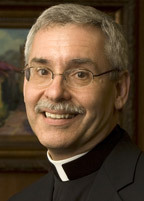
By Bishop Anthony B. Taylor
Bishop Anthony B. Taylor delivered this homily June 26 for the feast of Corpus Christi.
When I was in high school a non-Catholic girl once asked me, "Where exactly do you get the blood for Mass?" Obviously she didn't know much about the Catholic faith or that the blood in question is the blood of Jesus, but at least she knew it was blood. You'd be amazed at how many otherwise good Catholics refer to our eucharistic ministers as wine ministers rather than as ministers of the Precious Blood. What you and I receive at Communion retains the appearance and taste of bread and wine, but that's no longer what it is.
By means of the words of consecration, Jesus changes them into his very own body and blood, soul and divinity. And by receiving Jesus really present in this transformed food, you and I are transformed as well into the body of Christ, his blood now flowing in our veins, we become -- in a certain sense -- Christ living and active in our world today.
In_today's_Gospel taken from the much longer Bread of Life Discourse in John 6, Jesus_proclaims_six truths about the Eucharist, 1) which he is: I am the living bread come_down_from heaven, 2) which is his real body and blood: The bread I will give is my flesh for the life of the world, 3) which we eat and drink: My flesh is true food and my blood is true drink, 4) which unites us with Jesus: Whoever eats my flesh and drinks my blood remains in me and I in him, 5) which thereby gives us life: The one who feeds on me has life because of me, and 6) since Jesus is divine, the life Jesus gives us is eternal: Whoever eats my flesh and drinks my blood has eternal life and I will raise him on the last day.
Thus in the Eucharist we eat and drink Jesus' real body and blood, which unites us with him and gives us eternal life. But every gift looks for a response and even though what we can give God in return is very small, he still expects us to reciprocate, to do for others as he has done for us. And the kind of response God expects is summarized in the two names by which this sacrament is known: Eucharist and Communion.
Eucharist is the Greek word for "thanksgiving" and it refers to the fact that out of gratitude for Jesus' total gift of himself to us, the Eucharist now obligates us to reciprocate by giving ourselves totally to him in return. So when we offer Jesus' body and blood to God the Father in the Mass, we offer our own body and blood too, united to that of Jesus, meaning that we for whom Jesus sacrificed his whole self are now obligated -- out of gratitude -- to sacrifice our whole self in return.The other word, Communion, describes the effect produced in the community of believers through our reception of Jesus' body and blood, especially when all of us do gratefully reciprocate Jesus' total gift of himself to us, namely Communion with Jesus and each other and all believers everywhere and in every age. That's your commitment and that's God's promise which you ratify when you sing the "Great Amen" at the end of the Eucharistic Prayer and reaffirm when you say "Amen, I agree, I relieve" just before receiving -- gratefully -- the Eucharist, Jesus' real body and blood, in Communion with all your other brothers and sisters in Christ.
Audio from Bishop Taylor's homilies are regularly posted in English and Spanish on the diocesan website. Listen to them at www.dolr.org/audio/index.php.


No comments:
Post a Comment